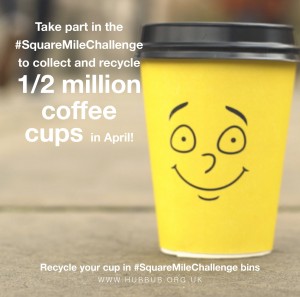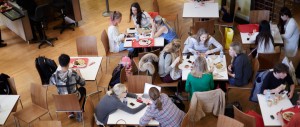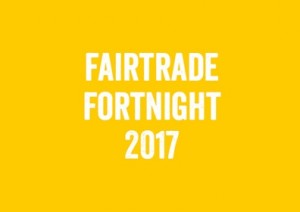This week is UK Coffee Week, so we are taking the chance to talk about some of the great sustainability things happening in the coffee world. The industry often gets bad press, with environmentally damaging and exploitative farming methods, and often wasteful habits at the consumption end (disposable coffee cups, anyone?).
Luckily, there are now many initiatives trying to improve this image, and make the industry more sustainable. Last weekend I visited the London Coffee Festival, and picked up a few interesting things:
UK Coffee Week:
Rather than just an excuse to drink lots of coffee (not that we need an excuse for that…), this is a week-long fundraising campaign by coffee shops all over the country. Participating coffee shops raise money for Project Waterfall, which aims to provide clean water to coffee-growing communities. Coffee is water-intensive to grow, but those growing it often have little access to clean water and sanitation. So far, the project has raised £600,000 and provided clean drinking water to over 24,000 people. Find out more about coffee shops taking part on this map.
Fairtrade and more:
Coffee production is often exploitative and environmentally damaging, but it seems both coffee shops and customers are looking for ways to change this. Among the many coffee shops selling Fairtrade coffee, there are a few that have set up their own, direct trading schemes. As part of the festival, Union Coffee delivered a talk on how they make sure their coffee is from sustainable sources. This includes working with the same producers over many years, paying a premium on top of Fairtrade prices, and training employees to audit their supply chain. Many see this as a win-win situation: farmers receive a stable income and are able to improve their produce to sell it for higher prices in the future, and buyers have reliable sources and increasingly better products. While this might only work as long as consumers are happy to pay higher prices for premium products, it is certainly an interesting new direction.. Other coffee roasters sourcing their coffee directly from producers are Pact Coffee or Cafédirect.
Ditch the disposable cup
Following a lot of media attention in the last few months, disposable coffee cups were a big topic. Hubbub and Simply Cups took their Square Mile Challenge to the London Coffee Festival, installing three of their iconic yellow cup-bins, as well as smaller bins and posters around the venue. With significant quantities of disposable cups given out during the festival, the bins were in high demand!
As well as using the cup recycling facilities, visitors could hear about alternatives to disposable paper cups. Biodegradable and compostable cups were on show, as well as many reusable coffee cups. If you have been to the cafés on campus, you have probably seen the King’s College London KeepCups on sale. They were represented at the London Coffee Festival, and showed off the impressive number of universities that sell branded reusable cups on campus. With many companies now offering reusable cups in all shapes and sizes, disposable cups will hopefully be a thing of the past!
 Interested to know what happens at King’s? The Maughan Library is currently taking part in the Square Mile Challenge, which is aiming to recycle 500,000 coffee cups by the end of April. If you are having coffee there, make sure you look out for the special coffee cup bins (and watch this space for future developments on other campuses)! King’s Food also offer a discount on hot drinks if you bring your own reusable cup. King’s is also working towards becoming a certified Fairtrade University.
Interested to know what happens at King’s? The Maughan Library is currently taking part in the Square Mile Challenge, which is aiming to recycle 500,000 coffee cups by the end of April. If you are having coffee there, make sure you look out for the special coffee cup bins (and watch this space for future developments on other campuses)! King’s Food also offer a discount on hot drinks if you bring your own reusable cup. King’s is also working towards becoming a certified Fairtrade University.



